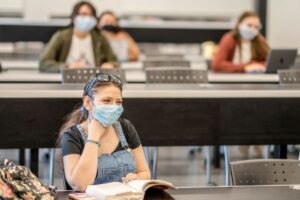Writer: Alejandro Sanchez
 2 min read January 2022 — With the rapid spread of the omicron COVID-19 variant, colleges and universities in North Carolina are making the necessary accommodations to guarantee the safety of students as the spring semester begins.
2 min read January 2022 — With the rapid spread of the omicron COVID-19 variant, colleges and universities in North Carolina are making the necessary accommodations to guarantee the safety of students as the spring semester begins.
Last Thursday, the state of North Carolina reported the highest daily number of cases since the onset of the pandemic, forcing schools to explore a variety of alternatives for the return to classes. From temporarily pushing academic activities online to encouraging testing and vaccination, colleges and universities in Raleigh-Durham are ready to pull from the experiences acquired over the past two years to tackle the latest development in the pandemic.
Duke University, for example, will move all in-person and hybrid classes online until Jan. 18, instead of Jan. 10 as originally planned. Although the school will be open for students who live on campus from Jan. 2, residents are strongly encouraged to delay their return until the third week of January. Additionally, by Feb. 1, Duke will require all staff to provide proof of the booster shot to reduce the risk of infections.
“This is a disappointing reality that requires us to once again revise our plans for the beginning of the spring semester in order to protect the health of our campus and community,” Duke leadership said in a related press release sent to all Duke students, faculty and staff.
Similarly to Duke, the University of North Carolina at Charlotte will be conducting classes remotely from the start of the spring semester until Jan. 24. The school also announced that attendance to athletic events will be limited to relatives of participants as a measure to avoid exposure to the new virus variant. In a press release, UNC highlighted the importance of vaccinations and encouraged students and staff to receive a booster shot. Unvaccinated students, as well as all students who live on-campus regardless of their vaccination status, will be required to present a test prior to their return from winter break.
“Our resilience and ability to persevere and realize our teaching, research and service missions throughout this pandemic are due to the commitment of our community,” UNC leadership said in a press release.
Campbell University is also designing a preventive strategy for its spring semester that requires students, faculty and staff to either provide proof of vaccination or a negative test 48 hours prior to their return to classes. Anyone with COVID-19 symptoms is asked not to return to classes and to visit a primary care physician.
Despite the concerning rise in COVID-19 cases, colleges and universities in Raleigh-Durham are well prepared to mitigate the challenges posed by omicron. Compared to 2020 and 2021, the higher-education sector is much better equipped now to ensure a safe and efficient return to classes this spring.

